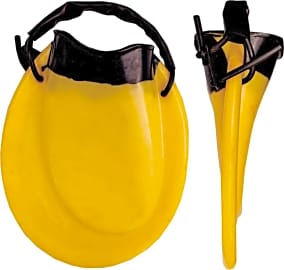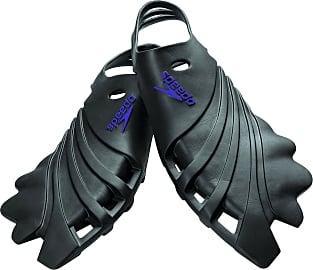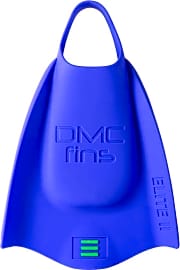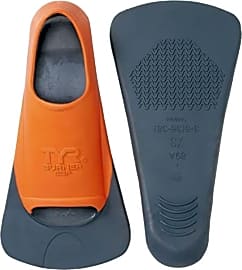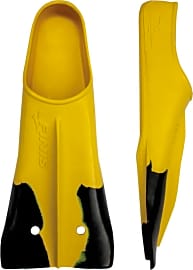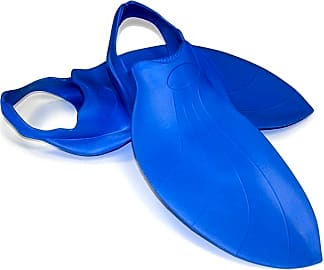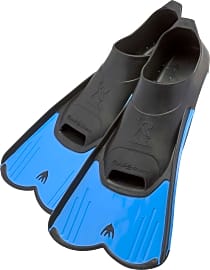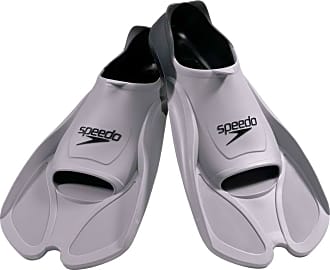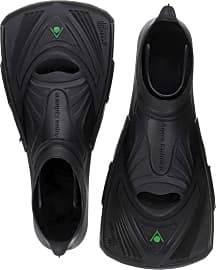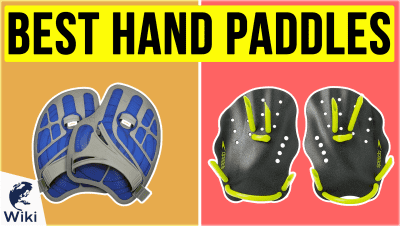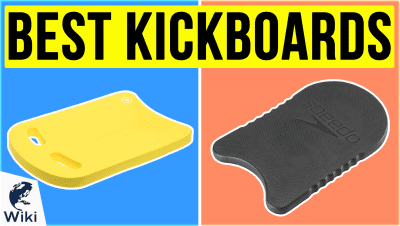The 10 Best Swim Training Fins

This wiki has been updated 37 times since it was first published in April of 2016. Serious competitive swimmers know that working out on a regular basis is essential in order to improve speed, stamina, and form in the pool. These training fins may come in different shapes and sizes, but all are designed to help you develop a powerful, natural kick while increasing ankle flexibility, minimizing fatigue, and strengthening muscles, so you can perform at your best. When users buy our independently chosen editorial recommendations, we may earn commissions to help fund the Wiki.
Editor's Notes
October 26, 2020:
Whether you are a serious athlete or simply looking to build leg muscles and improve your cardio endurance, swim training fins can be a great aid that leads to better performance. Generally speaking, the heavier and stiffer a fin is, the more strenuous they will be to use, and vice versa for more flexible fins. With this in mind, it is important to pick the right blade structure to fit your needs. Someone looking to increase their speed using short drills and who wants to be able to train at race cadence, will be better off with something very short and stiff, like the TYR Sport EBP Burner. Conversely, if looking to increase your endurance with long training sessions, the Arena Powerfin Pro might be a better choice, since they offer enough flexibility to help mitigate fatigue while also building leg strength.
The DMC Fins Elite offer a good balance of stiffness and flexibility, which is why they are used by many professional athletes. They are also very dense, which helps keep the foot below the waterline when kicking, which is important for efficiency, but at the same time they are designed to produce enough lift to keep you in a proper body position.
The Finis Positive are a versatile option and one of the few that work well for frog kicks when performing the breast stroke. That being said, you could just as easily use them for freestyle and backstroke training. Another model that immediately stands out for their unusual design are the Speedo Nemesis. Thanks to their small size, they are easy to pack in a gym bag, as are the Finis Positive, yet they have smart features that allow them to produce a lot of resistance despite the compact blade.
While you will generally want a pair of dedicated fins for snorkeling, the Cressi Light could work well enough for that use in pinch.
November 30, 2019:
Professional and amateur swimmers alike know that achieving perfect form — and maintaining it over time — is no easy task. Training fins can make the process a bit easier by making your workout harder. They are great for building up strength and increasing endurance, and they can help you get more out of your sessions in the water. From a technical standpoint, fins make it possible to focus on your form and make adjustments to your movements that will stick in your muscle memory long after the fins have been removed. They take stress off the shoulders and can help with ankle flexibility, too. If you're looking to make your workouts even more challenging, consider investing in a pair of hand paddles or a kickboard.
The Capas Freestyle and DMC Fins Elite have been added to the list, chosen because of their popularity and soft, comfortable constructions. The Mares Head Energy and Speedo Short Blade have been removed due to confirmed complaints about quality and effectiveness.
Special Honors
Sprint RothHammer Water Walkers A departure from the norm, the Sprint RothHammer Water Walkers are designed to offer a low-impact workout that more closely replicates walking or running that swimming. While they probably won't improve your lap time or form, they can still provide a strenuous leg workout and help you improve your cardio endurance. athleticstuff.com
A Brief History Of Swim Fins
He did, however, mention them in his memoirs and he was inducted into the International Swimming Hall of Fame 240 years after his death.
A number of notable inventors experimented with swim fins throughout the years, including Leonardo da Vinci and Ben Franklin. In his younger days, Ben Franklin was an avid swimmer, and his very first invention as a young boy was a pair of oval planks designed to be used as hand fins. He drilled holes through the center so he could easily hold onto them. They allowed him to attain some extra thrust through the water, but they also tired him out very quickly and caused wrist fatigue.
His next idea was to strap a pair of boards to his feet. Unfortunately he found them awkward and clunky and decided to toss the whole idea rather than perfect the concept. He did, however, mention them in his memoirs and he was inducted into the International Swimming Hall of Fame 240 years after his death.
In 1914, a Frenchman named Louis Marie de Corlieu created the prototype of what would eventually evolve into the modern day swim fin. It was almost twenty years after inventing the swim fin that he actually filed for and received a patent. In 1939, he began mass production and started selling the swim fin.
In 1940, another inventor named Owen Churchill patented another type of swim fin, which was made out of vulcanized rubber. He claimed his design was inspired by natives in Tahiti, which would weave mats and dip them in tar to harden before strapping them to the feet and using them for swimming. He also purchased a license from de Corlieu to mass produce the Frenchman's swim fins and sell them in the United States. Churchill was the first to coin the term "swim fins," which is now their common English name.
Benefits Of Swim Training With Fins
Some people think that using swim fins is like cheating: they may help you swim faster, but once you take them off you are still just as slow as you were. This is actually completely untrue. Using swim fins will increase your swimming speed and ability for a number of reasons, even after they have been taken off.
It also takes more energy to propel oneself through the water with fins, than without.
One of the most important aspects of swimming is proper technique and body positioning. Fins can add more propulsion to a swimmer's stroke, which increases their speed and pushes them higher in the water. Better swimmers plane, while poorer swimmers drag their legs lower in the water with a more vertical positioning. By using swim fins regularly when training, a person gets used to their body posture when planing and will work to replicate that after the fins have been taken off. This is called neuromuscular patterning. In essence, the nerves remember the feeling of swimming faster and higher, and the body will seek to replicate the same experience. The more it is repeated, the easier it is to replicate.
It also takes more energy to propel oneself through the water with fins, than without. For those who are looking to train their body, the added cardiovascular conditioning that takes place when wearing fins is a good thing. Wearing fins also reminds a person to kick their legs more when swimming as opposed to just letting them drag behind their body.
One of the biggest advantages of wearing fins is increasing ankle flexibility. The better the range of motion in your ankles, the better you will be able to flow through the water. Many people have trouble extending their feet to a position where there are completely horizontal in the water. Instead, they often leave then at a somewhat vertical angle, which creates more drag and slows them down. It might not be noticeable when not wearing fins, but when they are on, the drag is extremely noticeable causing the person to work harder to keep their feet horizontal and helping to stretch the muscles and tendons in the ankle.
Getting The Right Fit On Swim Fins
Picking the right size swim fin is vital to comfort and performance. A well fitting swim fin should feel snug, without being overly tight. The tighter the fit, the better they will transition the power of your kick to the fin, but if they are too tight, they can cut off the circulation. Loose fins are inefficient as they will move about on the foot, transferring less of your power to your kick and also potentially causing blisters.
When buying a closed heel swim fin, a person will usually be okay if they purchase a pair in the same size as their running shoes. Some brands are known for running a little small, so if buying them sight unseen, read through user reviews whenever possible to see if they fit true to size. If you are in between sizes, it is best to pick the larger size. You can always wear a pair of thin fin socks to help them fit tighter, but you cannot make them bigger.
Most open back swim fins and dive fins require the user to wear either fin socks or dive boots. These are made specifically to be worn inside of fins to prevent blistering and chaffing. Since you will most likely be wearing some kind of under layer when using open back fins, it is often best to buy a pair one size up from your running shoes.


